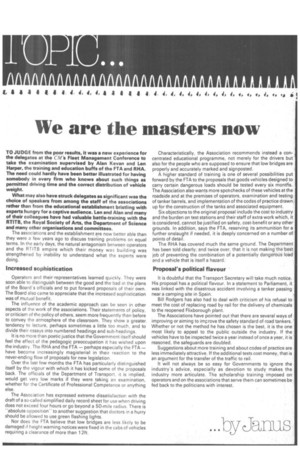We are the masters now
Page 55

If you've noticed an error in this article please click here to report it so we can fix it.
TO JUDGE from the poor results, it was a new experience for the delegates at the CM'S Fleet Management Conference to take the examination supervised by Alan Kevan and Len Harper, the training and education buffs of the FTA and RHA. The need could hardly have been better illustrated for having somebody in every firm who knows about such things as permitted driving time and the correct distribution of vehicle weight.
What may also have struck delegates as significant was the -choice of speakers from among the staff of the associations rather than from the educational establishment bristling with experts hungry for a captive audience. Len and Alan and many of their colleagues have had valuable battle-training with the RTITB, the Royal Society of Arts, the Department of Science and many other organisations and committees.
The associations and the establishment are now better able than they were a few years ago to discuss training problems on equal terms. In the early days, the natural antagonism between operators and the RTITB empire which their money was building was strengthened by inability to understand what the experts were doing.
Increased sophistication
Operators and their representatives learned quickly. They were soon able to distinguish between the good and the bad in the plans of the Board's officials and to put forward proposals of their own. The Board also came to appreciate that the increased sophistication was of mutual benefit.
The influence of the academic approach can be seen in other aspects of the work of the associations. Their statements of policy, or criticism of the policy of others, seem more frequently than before to convey the atmosphere of the classroom. They show a greater, tendency to lecture, perhaps sometimes a little too much, and to divide their essays into numbered headings and sub-headings.
It is no more than poetic justice that the Government itself should feel the effect of the pedagogic preoccupation it has wished upon the industry The RHA and the FTA — perhaps especially the FTA — have become increasingly magisterial in their reaction to the never-ending flow of proposals for new legislation.
Over the last few months the FTA has particularly distinguished itself by the vigour with which it has kicked some of the proposals back. The officials of the Department of Transport, it is implied, would get very low marks if they were taking an examination, whether for the Certificate of Professional Competence or anything else.
The Association has expressed extreme dissatisfaction with the draft of a so-called simplified daily record sheet for use when driving does not exceed four hours or go beyond a 50-mile radius. There is -absolute opposition" to another suggestion that doctors in a hurry should be allowed to use green flashing lights.
Nor does the FTA believe that low bridges are less likely to be damaged if height warning notices were fixed in the cabs of vehicles requiring a clearance of more than 1 2ft. Characteristically, the Association recommends instead a concentrated educational programme, not merely for the drivers but also for the people who are supposed to ensure that low bridges are properly and accurately marked and signposted. A higher standard of training is one of several possibilities put forward by the FTA to the proposals that goods vehicles designed to carry certain dangerous loads should be tested every six monttis. The Association also wants more spot-checks of these vehicles at the roadside and at the premises of operators, examination and testing of tanker barrels, and implementation of the codes of practice drawn up for the construction of the tanks and associated equipment. Six objections to the original proposal include the cost to industry and the burden on test stations and their staff of extra work which, it is considered, cannot be justified on safety, cost-benefit or any other grounds. In addition, says the FTA, reserving its ammunition for a further onslaught if needed, it is deeply concerned on a number of. points of detail. The RHA has covered much the same ground. The Department has been told clearly, and twice over, that it is not making the best job of preventing the combination of a potentially dangerous load and a vehicle that is itself a hazard.
Proposal's political flavour
It is doubtful that the Transport Secretary will take much notice. His proposal has a political flavour. In a statement to Parliament, it was linked with the disastrous accident involving a tanker passing near a camping site in Spain.
Bill Rodgers has also had to deal with criticism of his refusal to meet the cost of replacing road by rail for the delivery of chemicals to the reopened Flixborough plant.
The Associations have pointed out that there are several ways of improving or aiming to improve the safety standard of road tankers.' Whether or not the method he has chosen is the best, it is the one most likely to appeal to the public outside the industry. If the vehicles have to be inspected twice a year instead of once a year, it is reasoned, the safeguards are doubled.
Suggestions about more training and about codes of practice are less immediately attractive. If the additional tests cost money, that is an argument for the transfer of the traffic to rail.
It will not always be so easy for Governments to ignore the industry's advice, especially as devotion to study makes the industry more articulate. The scholarship training imposed on operators and on the associations that serve them can sometimes be fed back to the politicians with interest.




























































































































